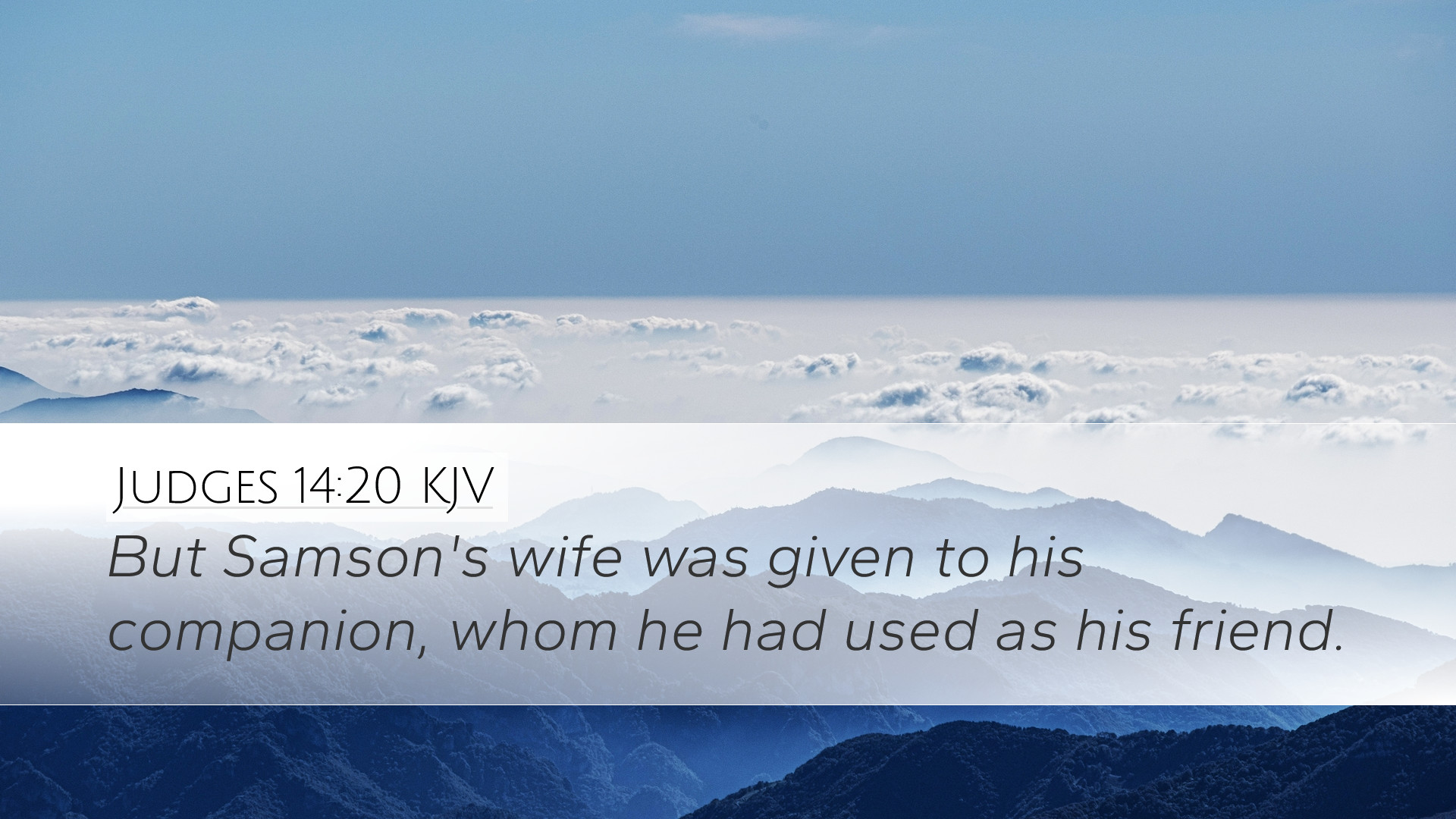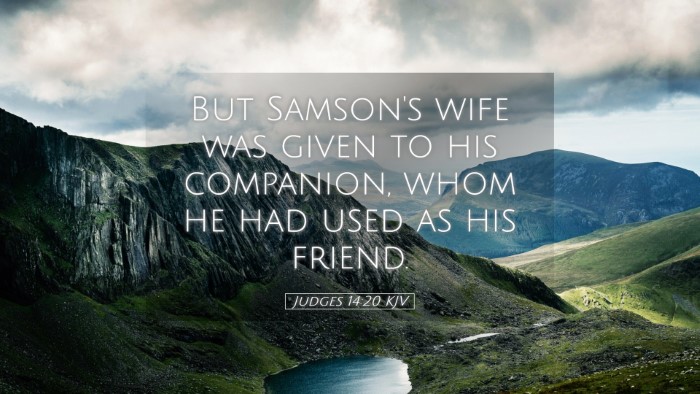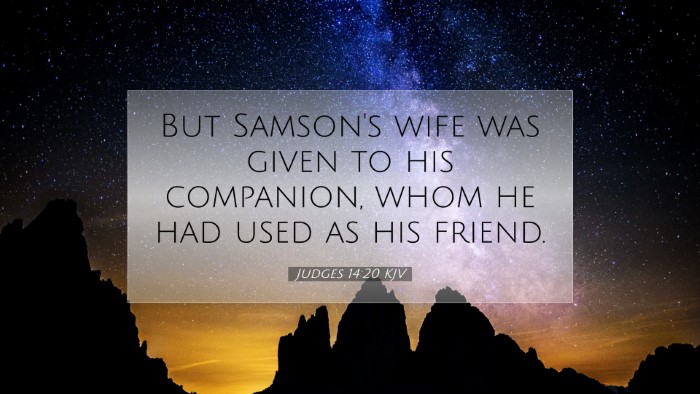Old Testament
Genesis Exodus Leviticus Numbers Deuteronomy Joshua Judges Ruth 1 Samuel 2 Samuel 1 Kings 2 Kings 1 Chronicles 2 Chronicles Ezra Nehemiah Esther Job Psalms Proverbs Ecclesiastes Song of Solomon Isaiah Jeremiah Lamentations Ezekiel Daniel Hosea Joel Amos Obadiah Jonah Micah Nahum Habakkuk Zephaniah Haggai Zechariah MalachiJudges 14:20
Judges 14:20 KJV
But Samson's wife was given to his companion, whom he had used as his friend.
Judges 14:20 Bible Commentary
Bible Commentary on Judges 14:20
Judges 14:20 (KJV): "But Samson's wife was given to his companion, whom he had used as his friend."
Introduction
Judges 14:20 encapsulates a profound moment in the narrative of Samson, one of the last judges of Israel. The verse not only highlights personal betrayal and the complexities of relationships but also serves as a critical juncture in God's plan for His people. This commentary synthesizes insights from prominent public domain commentators to draw out theological, practical, and historical implications for contemporary readers, particularly pastors, theologians, and students of scripture.
Contextual Analysis
To fully appreciate Judges 14:20, it is essential to consider its context within the broader narrative of Samson's life and the period of the Judges. The book of Judges describes a cycle of apostasy, oppression, repentance, and deliverance. Samson was raised up as a deliverer, yet his life was marked by personal flaws and struggles, reflecting the turbulent times of Israel.
Character of Samson
As highlighted by Matthew Henry, Samson's character is a mixture of divine empowerment and personal weakness. He is endowed with great strength yet remains enslaved to his impulses, particularly concerning women. This duality presents a model of the struggle against sin and the importance of fidelity to God's commandments.
Samson's Marriage
Samson's decision to marry a Philistine woman was not in keeping with God’s commands to His people, which prohibited intermarriage with the surrounding nations. Adam Clarke emphasizes that this action reflected Samson's inclination towards the sensuous rather than the sacred, showcasing a poor choice rooted in the desire for immediate gratification rather than spiritual integrity. This marriage ultimately sets the stage for conflict with the Philistines, revealing the tensions between personal choices and divine destiny.
The Betrayal of Trust
Judges 14:20 marks a moment of betrayal, where Samson’s wife is given to his companion. Here, the sense of sport and amusement prevalent in the Philistine culture is evidenced, as noted by Albert Barnes. The betrayal not only signifies personal loss for Samson but illustrates how external pressures and betrayal can devastate personal relationships and community ties.
Implications of Betrayal
- Personal Pain: The emotional toll of betrayal is significant. Pastoral care can draw from this narrative to address the realities of hurt, urging the faithful to seek healing in Christ.
- Community Consequences: The actions taken by Samson's wife and her father display a lack of understanding of fidelity and commitment in relationships, which leads to wider societal repercussions.
- Divine Sovereignty: Despite human betrayal, God's plan comes to fruition. Clarke notes that God can work through human failures, turning them into instruments for eventual deliverance.
The Role of Companionship
The term "companion" in this verse is significant. It suggests a deeper bond that was intended to be based on mutual respect and loyalty. The betrayal of this companion highlights the fragility of human relationships and the potential for rivalry and discord to arise from jealousy and betrayal.
Insights on Friendship and Loyalty
Henry points to how true friendships should be nurtured and protected. In a pastoral context, fostering genuine relationships among congregants mirrors the covenantal love God expresses towards His people. This teaches that commitment in relationships is paramount to achieving peace and unity within the church.
Theological Reflection
Judges 14:20 serves as a rich text for theological reflection on themes such as divine providence, human agency, and the repercussions of sin. The act of giving Samson's wife to another man can be seen as emblematic of Israel's unfaithfulness to God, mirroring the spiritual adultery that often characterizes the nation during the time of the judges.
Divine Providence Amidst Human Failures
- God's Purpose: Even in the chaos of human sinfulness, God retains the authority to use imperfect circumstances for His glory and the ultimate good of His people.
- Samson's Flaws and God's Will: While Samson exemplifies the struggle with personal sin, his story illustrates that God's will is unthwarted, and His purpose prevails despite human shortcomings.
Conclusion
Judges 14:20 is a powerful reminder of the fragility of human relationships and the destructive nature of betrayal. It reflects the larger narrative of the Israelite experience during the Judges period, emphasizing the importance of fidelity and divine reliance. For pastors and theologians, this passage serves as an admonition to both watch over the community's relationships and to remind individuals of the profound healing and strength available in Christ amidst life's trials.
Ultimately, the commentary on this verse leads the reader to reflect on their own lives and relationships, the importance of commitment, and the assurance that God’s sovereignty can bring hope even through betrayal.


